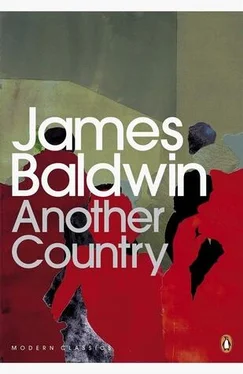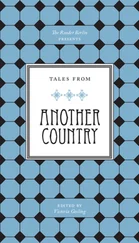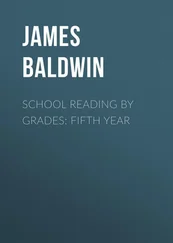Hear my cry, hear my call,
Take my hand, lest I fall,
Precious Lord!
The applause was odd — not quite unwilling, not quite free; wary, rather, in recognition of a force not quite to be trusted but certainly to be watched. The musicians were now both jubilant and watchful, as though Ida had abruptly become their property. The drummer adjusted her shawl around her shoulders, saying, “You been perspiring, don’t you let yourself catch cold”; and, as she started off the stand, the piano-player rose and, ceremoniously, kissed her on the brow. The bass-player said, “Hell, let’s tell the folks her name .” He grabbed the microphone and said, “Ladies and gentlemen, you’ve been listening to Miss Ida Scott. This is her first— exposure, ” and he mopped his brow, ironically. The crowd laughed. He said, “But it won’t he her last.” The applause came again, more easily this time, since the role of judge and bestower had been returned to the audience. “We have been present,” said the bass-player, “at an historic event.” This time the audience, in a paroxysm of self-congratulation, applauded, stomped, and cheered.
“Well,” said Vivaldo, taking both her hands in his, “it looks like you’re on your way.”
“Were you proud of me?” She made her eyes very big: the curve of her lips was somewhat sardonic.
“Yes,” he said, after an instant, gravely, “but, then, I’m always proud of you.”
Then she laughed and kissed him quickly on the cheek. “My darling Vivaldo. You ain’t seen nothing yet.”
“I’d like,” said Eric, “to add my voice to the general chorus of joy and gratitude. You were great, you really were.”
She looked at him. Her eyes were still very big and something in her regard made him feel that she disliked him. He brushed the thought away as he would have brushed away a fly. “I’m not great yet,” she said, “but I will be,” and she raised both hands and touched her earrings.
“They’re very beautiful,” he said, “your earrings.”
“Do you like them? My brother had them made for me — just before he died.”
He paused. “I knew your brother a little. I was very sorry to hear about his — his death.”
“Many, many people were,” said Ida. “He was a very beautiful man, a very great artist. But he made”—she regarded him with a curious, cool insolence—“some very bad connections. He was the kind who believed what people said. If you told Rufus you loved him, well, he believed you and he’d stick with you till death. I used to try to tell him the world wasn’t like that.” She smiled. “He was much nicer than I am. It doesn’t pay to be too nice in this world.”
“That may be true. But you seem nice — you seem very nice — to me.”
“That’s because you don’t know me. But ask Vivaldo!” And she turned to Vivaldo, putting her arm on his.
“I have to beat her up from time to time,” said Vivaldo, “but, otherwise, she’s great.” He stuck out his hand to the short man, who now stood behind Ida. “Hello there, Mr. Ellis. What brings you all the way down here?”
Ellis raised his eyebrows exaggeratedly and threw out his palms. “What do you think brings me down here? I had an uncontrollable desire to see Sammy’s Bowery Follies.”
Ida turned, smiling, still leaning on Vivaldo. “My God. I saw you down there at the bar, but I scarcely dared believe it was you.”
“None other,” he said, “and you know”—he looked at her with tremendous admiration—“you are an extraordinary young woman. I’ve always thought so. I must say, but now I’ve seen it. I doubt if even you know how great a career is within your grasp.”
“I’ve got an awfully long way to go Mr. Ellis, I’ve got such an awful lot to learn.”
“If you ever stop feeling that way, I will personally take a hairbrush to you.” He looked up at Vivaldo. “You have not called me and I take that very unkindly.”
Vivaldo suppressed whatever rude retort was on his tongue. He said, mildly, “I just don’t think I’ve got much of a future in TV.”
“ Oh, what an abysmal lack of imagination!” He shook Ida playfully by the shoulder. “Can’t you do anything with this man of yours? Why does he insist on hiding his light under a bushel?”
“The truth is,” said Ida, “that the last time anybody made up Vivaldo’s mind for him was the last time they changed his diapers. And that was quite a long time ago. Anyway,” and she rubbed her cheek against Vivaldo’s shoulder, “I wouldn’t dream of trying to change him. I like him the way he is.”
There was something very ugly in the air. She clung to Vivaldo, but Eric felt that there was something in it which was meant for Ellis. And Vivaldo seemed to feel this, too. He moved slightly away from Ida and picked up her handbag from the table — to give his hands something to do? — and said, “You haven’t met our friend, he just came in from Paris. This is Eric Jones; this is Steve Ellis.”
They shook hands. “I know your name,” said Ellis. “Why?”
“He’s an actor,” said Ida, “and he’s opening on Broadway in the fall.”
Vivaldo, meanwhile, was paying the check. Eric took out his wallet, but Vivaldo waved it away.
“I have heard of you. I’ve heard quite a lot about you,” and he looked Eric appraisingly up and down. “Bronson’s signed you for Happy Hunting Ground . Is that right?”
“That’s right,” said Eric. He could not tell whether he liked Ellis or not.
“It’s kind of an interesting play,” Ellis said, cautiously, “and, from what I’ve heard of you, it ought to do very good things for you.” He turned back to Ida and Vivaldo. “Could I persuade you to have one drink with me in some secluded, air-conditioned bar? I really don’t think,” he said to Ida, “that you ought to make a habit of working in such infernos. You’ll end up dying of tuberculosis, like Spanish bullfighters, who are always either too hot or too cold.”
“Oh, I guess we have time for one drink,” said Ida, looking doubtfully at Vivaldo, “what do you think, sweetie?”
“It’s your night,” said Vivaldo. They started toward the door.
“I’d like to mix maybe just a little bit of business in with this drink,” said Ellis.
“I figured that,” said Vivaldo. “What an eager beaver you are.”
“The secret,” said Ellis, “of my not inconsiderable success.” He turned to Ida. “I thought you told me yesterday that Dick Silenski and his wife would be here—?”
Something happened, then, in her face and in his — in his, wry panic and regret, quickly covered; in hers, an outraged warning, quickly dissembled. They entered the wide, hot street. “Eric saw them,” she said, calmly, “something happened, they couldn’t come.”
“The kids got into a fight in the park,” said Eric. “Some colored kids beat them up.” He heard Ida’s breathing change; he told himself he was a bastard. “I left them waiting for the doctor.”
“You didn’t tell me that,” cried Vivaldo, “Jesus! I’d better call them up!”
“That isn’t what you told me, either,” said Ida.
“They weren’t very badly hurt,” said Eric, “just bloody noses. But they thought they’d better have a doctor look at them and of course they didn’t want to leave them alone.”
“I’ll call them,” said Vivaldo, “as soon as we get to a bar.”
“Yes, sweetie,” said Ida, “you’d better do that. What a terrible thing to have happen.”
Vivaldo said nothing; kicked at a beer can on the sidewalk. They were walking west through a dark wilderness of tenements, of dirty children, of staring adolescents, and sweating grownups. “When you say colored boys,” Ida pursued, after a moment, “do you mean that was the reason for the fight?”
Читать дальше












